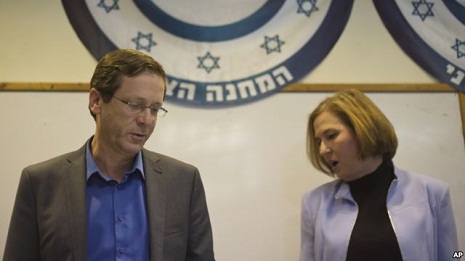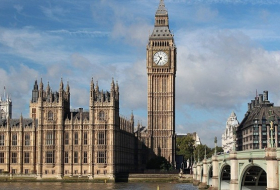Herzog told Israel`s Army Radio that the Zionist Union will be an opposition force to "challenge a narrow right-wing government."
Netanyahu plans to form a government in the next two to three weeks and has already spoken with smaller parties to form the 61-seat coalition he needs to govern.
A union of four Arab-led parties, called the Joint List, made history by becoming the third-largest party with 14 seats, giving Israel`s Arab minority leverage in parliament for the first time.
White House spokesman Josh Earnest said Secretary of State John Kerry called Netanyahu to congratulate him on the victory, and that President Barack Obama will do so in the coming days.
Earnest said unprecedented security cooperation between the United States and Israel will continue, and he voiced support for a two-state solution with Israel and the Palestinians.
Netanyahu said this week he would never support a Palestinian state, reversing the position he had held during his administration as the two sides conducted peace talks that eventually broke down.
The election was viewed closely regarding its impact on U.S.-Israeli relations. Differences on key issues, including the Iranian nuclear negotiations and stalled peace talks, have led to increased tensions between the two governments.
A U.N. spokesperson, speaking on behalf of Secretary-General Ban Ki-moon, said it will be incumbent on the new Israeli government to create the conditions leading to a final peace deal with the Palestinians. He said Israel should take steps including a cessation of illegal settlement building on occupied Palestinian land.
In Brussels, EU foreign policy chief Federica Mogherini said the bloc is committed to working with the incoming Israeli government on a "mutually beneficial relationship" and on re-launching the Middle East peace process.
In an interview with VOA, Middle East expert Aaron David Miller said the victory of Netanyahu`s Likud party does not mean the end for Middle East peace talks.
"The peace process will never die, it`s like rock and roll, it is essentially frozen," Miller said. "Whether or not the prime minister for campaign purposes or out of ideology walks back his commitment, I find much less consequential. Reportedly, he`s made commitments privately which endorses this view. So which one is it, his public commitment, his private commitment? I suspect that in the next 20-plus months, there will be an effort at least to prevent matters from deteriorating, and that could involve some sort of effort on the part of the secretary (John Kerry)," said Miller.
Senior Palestinian Authority official Abdullah Abdullah expressed disappointment with the result.
"Unfortunately it looks like the Likud will form the next government, and that means the old policy will continue," Abdullah said. "Netanyahu was very clear in his last days of the campaign that he will never allow a Palestinian state, he will not withdraw one centimeter from the occupied Palestinian territories, Jerusalem will stay united as the capital of Israel and that means it closes all the options for peace negotiations."
Analyst Mohammad Darawsche said the union of four Arab parties raised Arab voter turnout from 57 percent two years ago to 70 percent, almost the same level as Jewish turnout.
More about:
















































